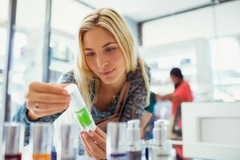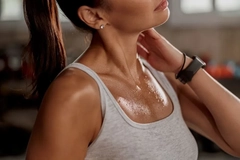Poisonous period products? UK charity detects pesticides in tampons

The Pesticide Action Network UK has found a pesticide in tampons at levels 40 times higher than permitted in drinking water. Researchers tested 15 boxes of tampons from UK shops and supermarkets for traces of pesticides and found that one box contained glyphosate.
The report — published by the Pesticide Action Network UK in collaboration with Women’s Environmental Network (WEN) and the Pesticide Collaboration — evaluated the products for the presence of aminomethylphosphonic acid, one of the primary degradation products of glyphosate.
Glyphosate is the world’s most commonly used herbicide. In 2015, the WHO declared glyphosate to be a “probable carcinogen,” linking it to cancer. Increasing evidence has also connected glyphosate to health conditions such as Parkinson’s.

The vagina is a highly absorptive tissue. Chemicals absorbed through the vagina directly enter the bloodstream, bypassing the body’s detoxification systems. Therefore, the report finding glyphosate in amounts 40 times higher than the legal limit for drinking water could be causing detrimental health effects to people who menstruate.
Amy Heley, public affairs manager at the Pesticide Collaboration, tells Personal Care Insights: “If this level of glyphosate is deemed to be unsafe in the water we drink, why is it allowed to appear in our period products? Our investigation reveals that women, girls, and those who menstruate may not be protected from exposure to harmful chemicals. And yet, most people remain completely unaware that this is even an issue.”
Disproportionate research
Despite half of the world’s population having periods, the safety of menstrual products is historically and widely under-assessed and under-regulated.
Pesticide Action Network UK says that relatively little research has been conducted on period products. The non-profit continues that the potential health impacts of the chemicals that tampons can contain remain largely unexamined.
 The pestpcide concentrations found are suspected to come from cotton farming. In the little body of research that has been conducted, studies have shown that period products can also contain various harmful chemicals such as phthalates, volatile organic compounds, PFAS, and heavy metals like lead and arsenic. These chemicals have been flagged as endocrine disruptors and linked to increased risks of reproductive and hormonal diseases, including endometriosis, infertility, and cancer.
The pestpcide concentrations found are suspected to come from cotton farming. In the little body of research that has been conducted, studies have shown that period products can also contain various harmful chemicals such as phthalates, volatile organic compounds, PFAS, and heavy metals like lead and arsenic. These chemicals have been flagged as endocrine disruptors and linked to increased risks of reproductive and hormonal diseases, including endometriosis, infertility, and cancer.
“Women, girls, and people who menstruate deserve full transparency about what’s in their period products. It is scandalous that pesticides linked to cancer, as well as other toxic chemicals linked to reproductive and hormonal diseases, can show up in period products. Consumers deserve robust regulation that guarantees the safety of these products,” says Helen Lynn, environmental campaign manager at WEN.
Menstruating people each use over 11,000 disposable sanitary products during their lifetime.
The risks of cotton farming
The report hypothesizes that the glyphosate pesticide could have ended up in the tampons from weedkillers used to grow cotton.
Many period products, such as tampons and pads, are made from cotton plants. Most of the world’s cotton is grown on conventional farms — with only around 1% of global cotton grown organically.
According to Pesticide Action Network UK, approximately 300 pesticides are used in cotton production globally, with roughly a third of these, including glyphosate, classified as highly hazardous pesticides.
Cotton farmers are exposed to toxic pesticides, and farmers in the Global South, in particular, often work in environments with little to no protective equipment. Many cotton farmers are women who face health risks daily by working with pesticides on the farm and in the home.
“Taking action to eliminate pesticides and other harmful chemicals from period products would be a major win. Not only for those of us that rely on such products but also for the communities and natural environment where the cotton is produced,” says the organization. The Pesticide Action Network UK is calling for the government to pay more attention to toxic chemicals in tampons.
The Pesticide Action Network UK is calling for the government to pay more attention to toxic chemicals in tampons.
Governmental action for safety
No laws beyond general consumer legislation requiring manufacturers to list the ingredients of period products are currently in place in the UK. The government also has no plans to tackle the growing evidence of chemicals in period products.
“We were genuinely shocked to find glyphosate in tampons sitting on UK shelves. This harmful chemical is already impossible to avoid since it’s sprayed by councils in streets and parks and contaminates much of our food and water due to overuse in agriculture,” says Josie Cohen, Interim Director at Pesticide Action Network UK.
“We urgently need to reduce our overall toxic load and should not have to worry about glyphosate and other highly hazardous pesticides in our period products. This is a blatant gap in health and safety regulation that the government urgently needs to address.”
Pesticide Action Network UK asserts that the UK lacks a robust regulatory framework to ensure that period products are safe to use. It calls for governmental action by implementing a testing scheme to ensure they are free of chemical residues.
It also asks the government to require manufacturers to disclose all the ingredients and additives in period products.
Given that young people are particularly vulnerable to health impacts from chemicals, the report also calls for the UK government’s free menstrual products program in schools to immediately switch handing out tampons and pads to their organic equivalents and reusables such as period pants and menstrual cups.
However, previous research found that arsenic concentrations were higher in organic tampons.













